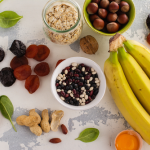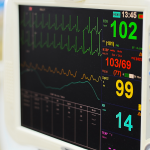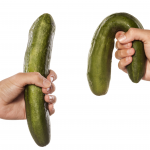We cannot digest fiber, but some researchers believe fiber helps lower our blood pressure while maintaining cardiovascular health. It turns out that the fiber is being digested by the bacteria of our gut – and that process may play a role in controlling blood pressure.
hypertension
There are probably few, if any, nutritional advisories that are as hotly debated as the appropriate level of sodium intake for healthy adults. Yes, the Dietary Guidelines and the American Heart Association recommend an upper limit of 2,300 mg sodium per day (about a teaspoon). But some new research is being added to the literature indicating that level of restriction may be too strict.
In most people's minds, high blood pressure is undoubtedly linked to salt intake. But there's another mineral that should also be considered — potassium. A recent review of several types of studies strongly indicates that it's not just a proper sodium level that helps one achieve, and maintain, normal blood pressure.
Vital signs matter. And they matter most when they're collected correctly and they provide accurate data. Dismiss them, or do them incorrectly, and the erroneous information will likely result in harmful medical decisions made on your behalf.
It isn’t hard to imagine that as our enlarging and ever-stiffening polarized political spheres come to a head, an article about what maintains the penis’ potency might be a kind of crowning glory.
The prevalence of dementia in the United States significantly declined from 11.6 percent in 2000 to 8.8 percent in 2012. The consequence of this impacts retirement, families, the health care system, life expectancy, morbidity and mortality, pensions, housing, transportation and countless societal realms.
Researchers from Boston report that eating white potatoes, even as potato chips, are linked to developing high blood pressure (the increased risk is small). But we question whether anyone should change their diets because of studies like this that show only associations, not causation.
High blood pressure frequently accompanies obesity and can lead to a myriad of ills, such as kidney problems, heart disease and stroke. A new study demonstrates that is also true for children and teens, and underscores the importance of achieving and maintaining a healthy body weight.
Women with relatively severe PMS may be at higher risk of developing high blood pressure (HBP), or hypertension. It's not clear how such an interaction may occur. Premenstrual syndrome sufferers may be at especially high risk of developing HBP before age 40. Thiamine and riboflavin may reduce the increased risk.
Continuing declines in overall U.S. death rates between 1969 and 2013 represent major public health gains, including in most specific illnesses. COPD death rate is higher than it was initially, but is also now declining along with smoking rates.
Yes, if you have hypertension (HTN, or high blood pressure), your risk of cardiovascular ills heart attack or stroke is increased.
A new series of articles by the NYTimes Gina Kolata focuses on improvements in dealing with emergency cardiac events, and indeed the progress has been remarkable. But that s not the solution to reducing the toll of our nation s leading killer: coronary disease.





